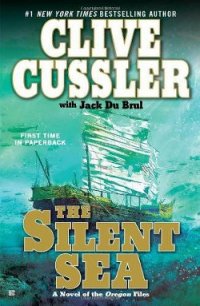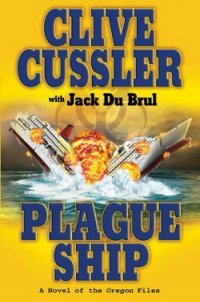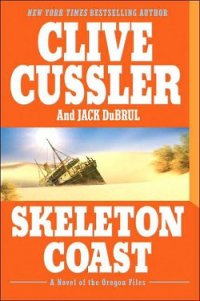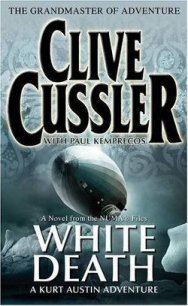Dark Watch - Cussler Clive (книга бесплатный формат .txt) 📗
“It’s like this, Chairman. We’ve all had a chance to talk about this ever since we started following the Maus. And the truth of the matter is, some jobs are worth more than money. We all pretty much agree we’d pay for the chance to nail these bastards to the nearest outhouse door. We’re backing your play one hundred percent.”
The crew gave a few “hear, hears” as they followed Hanley out of the boardroom.
Juan could only smile his gratitude to his people.
Sporting his Jeb Smith disguise again to foil casual observers on the beach, Juan leaned against the rail of the Oregon’s bridge wing. He’d been there long enough for the coat of scaly rust on the railing to turn his callused palms orange. The sun was a waning fireball setting slowly behind the mountains that rose in the distance behind Shere Singh’s Karamita Breakers Yard. The air was heavy with the smell of scorched metal, industrial solvents, and spilled bunker fuel. While coming north along the Sumatra coast he’d observed pristine white beaches and lush jungle. Most of the land was unspoiled and primeval. But around the yard it looked as though a cancer was eating away at the earth. The beach was a tarry morass, and the sea was the color of dishwater. With the exception of a new warehouse built out over the bay, all the buildings were dilapidated and coated with black dust. He had never seen a more depressing or dehumanizing place.
The massive scale of the buildings, cranes, and pieces of construction equipment rendered the workers almost to insignificance. The derricks towering over the yard swung slabs of steel from the beached ships to fenced-in areas where grimy men attacked them with torches, hammers, and their bare hands. From Juan’s vantage a quarter mile from the beach, they looked like ants devouring the carapace of some giant beetle.
And around the Oregon floated an armada of the damned. The fleet of derelict ships destined to be torn apart at the yard stretched nearly to the horizon. They comprised an archipelago of rusted hulks as haunted and forlorn as the spirits of the dead awaiting entrance into hell. The container ships, oilers, and bulk freighters reminded him of a herd of cattle in the pens of a slaughterhouse. The Oregon’s decrepit state was artful camouflage, but around her was the real thing, the consequence of salt air, raging seas, and neglect.
“Will you look at that,” Max Hanley said, stepping out from the bridge. He wore a pair of grease-stained coveralls. The oil was fresh. He’d just come from the engine room. “Compared to some of those tubs, I’d say the old Oregon looks shipshape and Bristol fashion.”
A deafening roar from inside the large warehouse reverberated across the bay and drowned out Cabrillo’s reply.
“What is that?” Max exclaimed after the noise faded.
“Murph’s new stereo?” Juan laughed. “I think there’s some kind of saw inside the warehouse. I read about them once — big chain-driven machines that can cut a ship like a slicer going through a loaf of bread.”
Max ducked into the bridge to retrieve a pair of binoculars from their cradle under the chart table. After a few minutes, the warehouse’s landward doors cranked open. Small diesel locomotives emerged towing a twenty-foot-thick slice of a ship. The segment had a graceful flare, almost like a sculpture, and had come from near the unknown vessel’s bow. A mobile crane lifted the section into the air once the train engines had reached the end of the tracks. The piece was open in the middle. Whatever ship it had come from had cargo holds rather than decks, most likely a bulk carrier or a tanker.
“Looks like a freighter-shaped cookie cutter,” Max remarked.
“Big cookie,” Juan said as the chunk of steel was laid on its side for workers to continue the disassembly process.
Something about his distracted tone caught Hanley’s attention. “What’s going on in that cesspool you call a mind?”
“We know Singh is involved. But I’ve been up here a couple of hours, and the place looks like it’s on the up-and-up except what might be going on inside the shed.”
“Where the ship saw is?”
“Uh-huh.” Juan studied the building from the binoculars he’d taken from Max. “I want to take a peek inside tonight.”
“What about the Maus?”
“She’ll be here soon enough. In the meantime, knowing what ship they’re tearing apart in there might tell us something.”
“It’s possible that it could be one of the ships the pirates hijacked before we were hired to stop them,” Hanley agreed. “Could be they brought her down here inside their other drydock.”
Cabrillo looked at his old friend. “I won’t know until I get inside.”
One of Max’s bushy eyebrows went up. “Just you?”
“No sense risking any of the crew on this. I’ll be in and out before they know I was there.”
“Linda Ross thought the same thing when she and her team boarded the Maus.”
“Take a look at the seaward side of the warehouse.”
Max took the binoculars and studied the sprawling structure. “What am I looking for?”
“The building’s built on pilings. I suspect that the metal siding doesn’t extend all the way to the sea floor, and even if it does, I’m sure the doors don’t. It would cause too much drag opening and closing them.
“You plan to swim under the doors.”
“Once inside I should be able to identify the ship. It won’t take more than an hour, and most of that is just swimming there and back.”
Max stared out at the massive shed, judging odds and risk. He came to a quick conclusion. “Use a Draeger rebreather,” he advised just as a horn sounded to end the workday onshore. “That’ll eliminate the trail of bubbles on your way in and out.”
An hour after midnight, Juan Cabrillo was in the amidships boat garage wearing a head-to-toe wet suit. The water surrounding the Karamita Yard was as warm as blood, but he needed the thin black Microprene as cover once he reached his goal. He wore thick-soled dive boots and had his fins ready on the bench next to where he sat. He was going over the Draeger unit. Unlike a scuba rig that provides fresh air for a diver with every breath, the German-made rebreather used powerful filters to scrub carbon dioxide when a diver exhaled in a closed-loop system that allowed for great endurance while eliminating the telltale stream of bubbles.
The Draeger could be dangerous at depths much below thirty feet, so Juan planned to stay close to the surface. In a slim waterproof pouch strapped under his right arm he had a minicomputer, a flashlight, and a Fabrique Nationale Five-seveN double-action automatic. The pistol fired the new 5.7mm ammunition. The advantage of the small, needlelike cartridges was that the matte-black weapon’s grip held twenty rounds with one in the chamber. Also, the bullets were designed to blow through most ballistic vests while at the same time not overpenetrate a target.
A dive knife was strapped on the outside of his right thigh and a dive computer to his left wrist.
A dive technician hovered nearby. “Just for the fun of it, I had Doc Huxley analyze a water sample,” the tech said as Juan finished his inspection. “She said the sea here is more polluted than the Cuyahoga River when it caught fire back in the sixties.”
“That’s your idea of fun?” Juan asked sarcastically.
“Rather analyze that gunk than swim in it.” The man grinned.
“You all set?” Max asked as he entered the darkened garage. Linda Ross was at his side, a slip of a girl compared to Max’s looming silhouette.
“Piece of cake.” Juan got to his feet. He nodded to the tech, who doused the red battle lamp.
“Eric’s at the helm,” Max told the chairman, “and Mark is at the weapons station just in case something goes wrong. Also Linc and a few of his SEALs are kitting up now and will be ready with a Zodiac by the time you’re halfway to the warehouse.”




